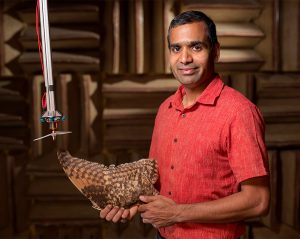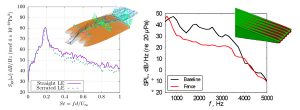Faculty Spotlight: Anupam Sharma
Author: John Burnett-Larkins
Author: John Burnett-Larkins

From owl-inspired research to enhancing department curriculum to helping make things run properly in the age of the COVID-19 pandemic, Anupam Sharma is playing key roles in the progression of the Department of Aerospace Engineering.
Sharma received significant news and journal coverage and the significant National Science Foundation (NSF) CAREER Award in 2017 when he launched one of his primary research focus areas: How to reduce the noise from jet engines and wind turbines through studying the unique feathers of owls and how they contribute to silent flight. Bioinspired airfoil/wing geometries have been developed in collaboration with Virginia Tech that have demonstrated noise reduction, and his research group looks to extend the application to new areas such as electric vertical takeoff/landing (eVTOL) vehicles.

Other projects include one funded by the Department of Energy for designing and building an innovative ultrasound bat deterrent to mitigate bat fatalities from wind turbines. These deterrents work like an ultrasound whistle that can be mounted on wind turbine blades and are “powered” by the air flow. An NSF-funded project is investigating the onset of dynamic stall which can cause catastrophic and/or fatigue failure in rotor blades of helicopters/turbomachines and in rapidly maneuvering aircraft.
Outside of the research lab, Sharma has direct input into the education of all aerospace engineering students in his position as associate chair. His responsibilities include determining course offerings and making the teaching assignments for all undergraduate and graduate courses; representing the department in the college-level undergraduate program committee; working with the department’s academic advisors to conduct senior exit surveys; and working to continually identify ways to improve the student learning experience.
Sharma has also played a significant role in the department’s major transition to planning and teaching courses during the COVID-19 pandemic (see related story in this newsletter).